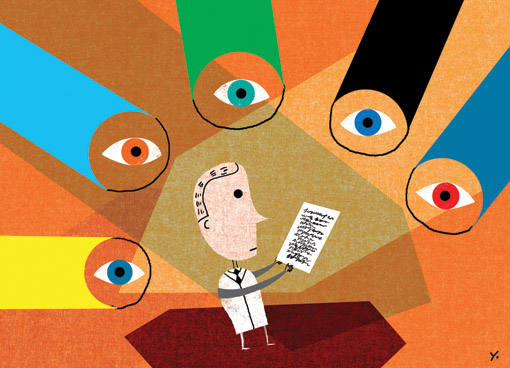 Martyn Clarke has worked in ELT classrooms as a teacher and trainer for over twenty years and in more than fifteen countries. He has taught English at all levels and in many contexts from one-to-one in financial institutions to rural schools with classes of eighty students.
Martyn Clarke has worked in ELT classrooms as a teacher and trainer for over twenty years and in more than fifteen countries. He has taught English at all levels and in many contexts from one-to-one in financial institutions to rural schools with classes of eighty students.
There are many reasons why peer observations with our teaching colleagues can be useful.
They often share your background and so understand your students, books, pressures, etc. They usually approach problems from the same practical perspective as you. They probably know you and so often understand the best way to approach you. And you can have developmental dialogues over time and so can explore ideas gradually.
Here are 5 observation activities that can be used with a colleague. They all follow a basic three-stage process of before, during and after the observation.
-
Spot the difference
In this observation activity two colleagues focus on the similarities and differences in their teaching.
Before:
The teacher gives the observer an outline basic plan of their lesson. The observer writes notes on the plan on what they would be doing as a teacher at the different stages of the lesson.
During:
The observer notes down the things that happen in the teaching process which don’t normally happen in their own lessons. These could be teaching behaviours, order of activities, methods of recording etc.
After:
The teacher and the observer analyse the information using any of the following questions as appropriate:
- How could you categorise the differences?
- How do you account for the differences (reasons/rationales)?
- What does the observer do instead to achieve the same goal?
- What criteria would you use to decide which alternative to take?
-
5 reactions
In this observation activity two colleagues focus on five observer reactions to what happens in the classroom. – e.g. Something that surprised/inspired/amused/confused/intrigued me.
Before:
The colleagues decide on five observer reactions that they would like to focus on. The teacher gives the observer an outline basic plan of their lesson.
During:
The observer notes down the things that happen in the lesson that cause the reactions they agreed on before the observation.
After:
The teacher and the observer analyse the information using any of the following questions as appropriate:
- Which observer reactions does the teacher find unexpected? Why?
- Why did the observer have these reactions?
- What do these reactions tell you about the ways the you think about teaching?
- What follow up questions do you have for each other?
-
Keep Two, Change Two
In this observation activity two colleagues identify two things they would do again, and two things they would do differently.
Before:
The teacher gives the observer an outline basic plan of their lesson.
During:
The observer notes down 2 things that the teacher does (either teaching behaviours or activities) that they would do again in the same lesson, and two things that they would change. The teacher does the same (either making a quick note during the lesson or immediately afterwards.
After:
The teacher and the observer analyse the information using any of the following questions as appropriate:
- Compare the selections. How do you account for any differences?
- What do you agree/disagree on? What does this tell you about your views on teaching and learning?
- Why would you make the changes? What differences would the changes make?
- What aspects of the context of the lesson influence your selections?
-
Away from the plan
In this observation activity two colleagues explore how and why lessons move away from the lesson plan.
Before:
The teacher gives the observer a detailed plan of their lesson.
During:
The observer notes down the places where things happen that are different to the plan, in terms of timings, teacher roles, order of activities, etc.
After:
The teacher and the observer analyse the information using any of the following questions as appropriate:
- What categories can you put the changes into (e.g. time/management/activity order/ teacher roles/student activities, etc.)? Which categories feature most often, and why?
- What strategies did the teacher have for returning to the lesson?
- What criteria did the teacher use to decide to move away from the plan?
- What differences did the changes make? What does this tell you about strategies for effective and realistic lesson planning?
-
Teacher Talk
In this observation activity two colleagues analyse what the teacher says in a lesson and why they say it.
Before:
The teacher and the observer work identify the types of talk that they think they use in a lesson, e.g. giving instructions, correcting errors, controlling behaviours, etc.
During:
The observer makes notes on when the teacher talks, and as far as possible the types of talk according to their categories. If other categories are found, these are noted.
After:
The teacher and the observer analyse the information using any of the following questions as appropriate:
- What surprises you about the data? Why does it surprise you? How do you account for the difference in your expectations?
- Are any categories more frequent than others? How do you account for this?
- How would you like to alter the incidence of teacher talk? More? Less? A change in focus?
- What dos this tell you about the quality of teacher talk and the quantity of teacher talk?


[…] via 5 Activities for Peer Observation — Oxford University Press […]
Really! It’s a useful article about the role of the observer during teaching in alternative with teacher,
[…] Martyn Clarke’s “5 Activities for Peer Observation” […]
[…] 5 Activities for Peer Observation […]